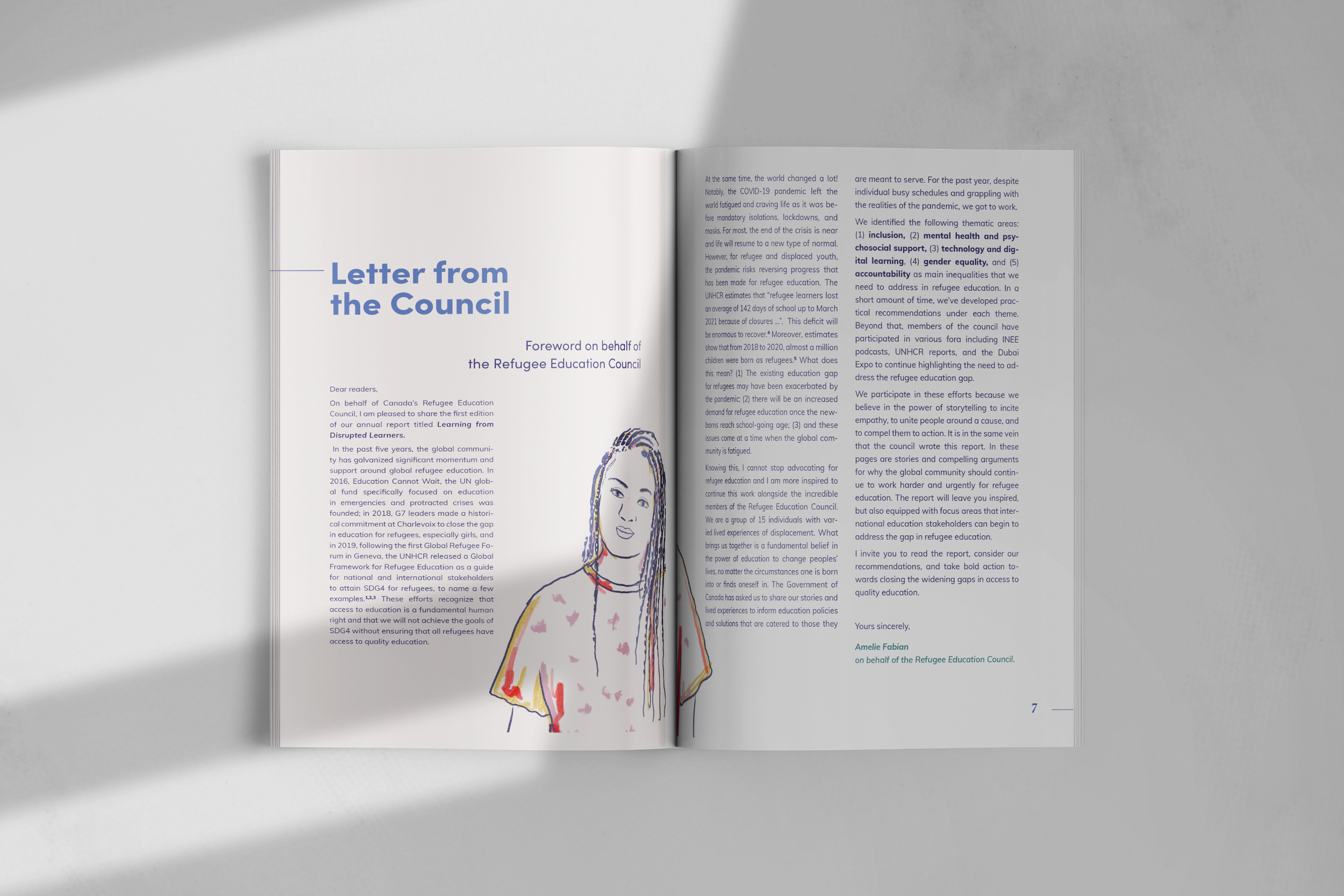REFLECTIONS FROM REFUGEE & DISPLACED YOUTH
On March 30, 2022, the Refugee Education Council launched Learning from Disrupted Learners, an anthology of stories and reflections from refugee and displaced youth, designed and published by Living Hyphen.
Hosted by World Vision Canada in partnership with the Canadian International Education Policy Working Group (CIEPWG), the Refugee Education Council was created to advise the Government of Canada's Together for Learning campaign – an international campaign to ensure that all refugee and displaced children have access to the education they need and deserve, and that is a part of their fundamental human rights. The creation of this council marks a remarkable shift in finding the solutions to the growing gaps in global education as refugee and internally displaced youth voices have historically been excluded from the conversation.
Made up of youth, teachers, parents, and community leaders with experience in forcible displacement, the council is fiercely advocating that solutions and approaches are shaped by their own lived experience and knowledge. According to their powerful manifesto:
“We believe in a world where all children have access to quality education and lifelong learning. This vision is underpinned by our five core themes of inclusion, mental health and psychosocial support, digital learning, gender equality, and accountability.”
Recognizing the significance of their own lived experiences, these youth have created Learning from Disrupted Learners, a collection of their stories to amplify their manifesto and vision for the future. We are humbled and honoured to share this powerful collection of stories with you.
The stories found in the pages of Learning from Disrupted Learners offer an intimate look into the experiences, emotions, hardships, and triumphs of young refugee leaders from around the globe. Their many nuanced stories provide a painful glimpse into the extreme challenges they must face and overcome as youth who have been displaced due to conflict, persecution, violence, natural disaster, or some other life-altering crisis.
Above all else, the stories shared in Learning from Disrupted Learners are a testament to the fact that these youth hold the keys to solving the most pressing issues that so deeply affect their lives.
THE REFUGEE EDUCATION COUNCIL
EDITORIAL TEAM
JUSTINE ABIGAIL YU
Editor
María Piñeros Murillo
Artistic Director
A LETTER FROM OUR EDITOR
According to the United Nations High Commissioner for Refugees, more than 84 million children, adolescents, and adults were forcibly displaced worldwide in 2021.1 This means that there are now more refugee people in the world than ever before in history.
The trauma that these people experience on a daily basis cannot be overstated. They are often separated from their loved ones, fleeing violence and destruction to find new homes that provide a modicum of safety. They face immense challenges accessing basic human rights, experience stigma and discrimination in their host communities, and, for many children and youth, are robbed of an education that is so critical to establishing a dignified future. These struggles have only been exacerbated over the last couple of years due to the global COVID-19 pandemic.
Knowing all this, it is easy then to celebrate the members of the Refugee Education Council as resilient. They are, of course. There is no question about that. They have not only survived to overcome conflict, persecution, violence, and/or natural disasters from their home countries. They have also gone on to become educators, activists, and community leaders on both the community and global level.
But to speak only of their resilience would be to ignore and erase the conditions that have forced and continue to force these youth to be resilient. To speak only of their resilience would be to hide the ongoing failures of governments, non-governmental organizations, and other institutions to provide the support, care, and basic human rights of which they are entitled.







